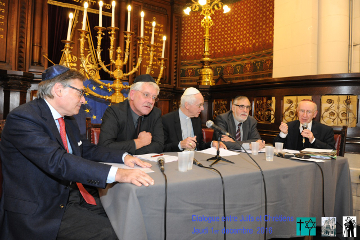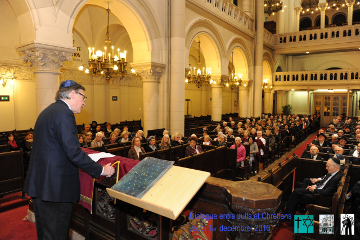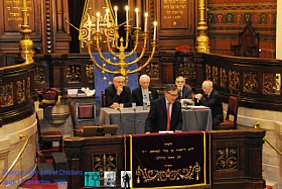Conference Report by Ms Lutgarde Verbouwe (O.C.J.B. secretary):
(A French version of the following report can be read here)
Historical Mile- and Cornerstones in Jewish – Christian Dialogue
On the initiative of father Thaddée Barnas, member of the O.C.J.B (Belgian Member of the ICCJ) and with its support (among others), the group Juifs et Chrétiens, engageons-nous! organised on December the 1st 2016, its sixth annual conference in the Great Synagogue of Europe in Brussels, gathering more than 200 people around the three recent Declarations, one, coming from the Vatican Commission for religious relations with the Jews, The gifts and the calling of god are irrevocable (Rom 11:29) - a reflection on theological questions pertaining to Catholic–Jewish relations on the occasion of the 50th anniversary of Nostra Aetate (n.4) (10th of December 2015), and both others coming from Jewish side: The Orthodox rabbinic statement on Christianity - To do the Will of Our Father in Heaven: Toward a Partnership between Jews and Christians (December 2015), and the Déclaration Française pour le Jubilé de fraternité à venir - Une nouvelle vision juive des relations judéo-chrétiennes (23th of November 2015).
The Chief Rabbi of Brussels, Albert Guigui developed some characteristics of dialogue and its importance in the construction of a pluralistic society. Lack of communication leads to murder, as the story of Cain and Abel (Gn 4:8) manifests, according to Jewish interpretation.
Remembering concrete steps taken by the Catholic Church since Nostra Aetate (1965), His Eminence Cardinal Jozef de Kesel picked out of the Vatican Declaration some significant and relevant passages for Jewish-Christian dialogue. He highlighted our common historical and scriptural roots (also prayers and liturgy) (pts 7.11.32-34.44 also 27). For Christians, they find in Jesus-Christ a dynamic of continuity, discontinuity, transcendence (pt 14) and their full accomplishment (pts 23.27.32). Today, Jews and Christians are sharing a common spiritual attitude, they are waiting for the coming or the second coming of the Messiah (the parousia). For both are children of Abraham (pts 21.32.33), and Jews are our "elder brothers" (Pope John-Paul II), our "fathers in faith" (Pope Benedict XVI) (pt 14), Jewish-Christian dialogue has special characteristics, distinguished from dialogue with other religions: "…one could however speak of a kind of ‘intra-religious’ or ‘intra–familial’ dialogue sui generis …The Jewish religion is not ‘extrinsic’ to us, but in a certain way is ‘intrinsic’ to our own religion" (pt 20). The interpretations of the scriptures reveal complementarities, but manifest irreducible differences as well (pts 13.31). Though, discernment will contribute to the discovering of the ‘other as a friend’, and give birth to the otherness in a true ‚I –you‛ relationship (M. Buber, E. Levinas), as a fruit of a long lasting psychological and spiritual process including dialogue, relationship and presence; in Talmudic terms: this is the transition from darkness to dawn.
Since the "replacement or supersession theology is deprived of its foundations" (pts 17.23), and "… the Catholic Church neither conducts nor supports any specific institutional mission work directed towards Jews" (pt 40), perhaps, the dawn of a new history is lighting.
For God never repealed or evoked his covenant with Israel (pt 34), "the gifts and the call of God are irrevocable" (cf. Rom 9:4; 11:29) (pt 36), and the Church does not replace the people of God of Israel (pt 23), "how to articulate, in theological terms, the relation between Israel and Verus Israel, and what about the full communion with the Catholic Church?", asked Professor Th. Gergely, Director of the Institute of Jewish studies in Brussels, moderator of the meeting.
For these considerations and because "the past decades both, the ‘dialogue ad extra’ and the ‘dialogue ad intra’, have led with increasing clarity to the awareness that Christians and Jews are irrevocably inter-dependent, dialogue between the two is not a matter of choice but of duty as far as theology is concerned. Jews and Christians can enrich one another in mutual friendship" (pt 13). Indeed "texts and documents, as important as they are, cannot replace personal encounters and face–to–face dialogues" (pt 8).
On the eve of the 500th anniversary of the Martin Luther's Reform (1517-2017), the President of the United Protestant Church of Belgium (E.P.U.V. /V.P.K.B.), the Reverend Steven H. Fuite transmitted to Mr Ph. Markiewicz, President of the Central Consistory of Belgium, the final text formulating their rejection of Luther's anti-Jewish expressions (the letter in French can be read here), as they figure in his work Von den Juden und ihren Lügen (On the Jews and Their Lies (1543)). However, a link of causality between Luther's expressions and later anti-Semitism in Lutheran environments is scientifically not established.
This renewed and purified conscious is undoubtedly a historical milestone, a cornerstone for future Jewish-protestant dialogue opening the path for deeper mutual collaboration and friendship.
The highlight of a beautiful evening!
 |  |

